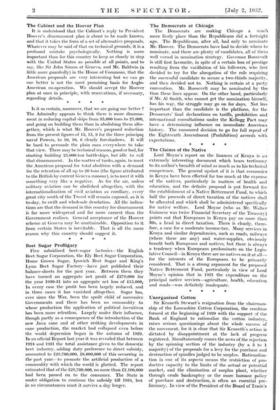Is it so certain, moreover, that we are going one
better ? The Admiralty appears to think there is more disarma- ment in reducing capital ships from 35,000 tons to 25,000, and going on building them than in abolishing them alto- gether, which is what Mr. Hoover's proposed reduction from the present figures of 15, 15, 9 for the three principal naval Powers, to 10, 10, 6 clearly foreshadows. It will be hard to persuade the plain man everywhere to take that view. There may be technical reasons, good or bad, for starting building 25,000-ton battleships, but idle to call that disarmament. In the matter of tanks, again, to meet the American proposal for total abolition with a demand for the retention of all up to 20 tons (the figure attributed to the British by current Geneva rumour), is to meet it with something very like a negative. As for the air, unless military aviation can be abolished altogether, with the internationalization of civil aviation as corollary, every great city south of the Tweed will remain exposed, as it is to-day, to swift and wholesale desolation. All the indica- tions are that the demand in this country for disarmament is far more widespread and far more earnest than the Government realizes. General acceptance of the Hoover scheme at Geneva may be unattainable. Opposition to it from certain States is inevitable. That is all the more reason why this country should suggest it.






































 Previous page
Previous page